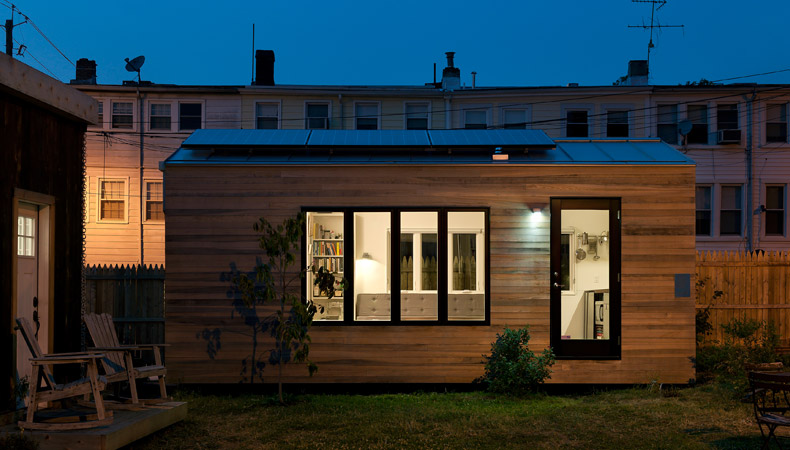
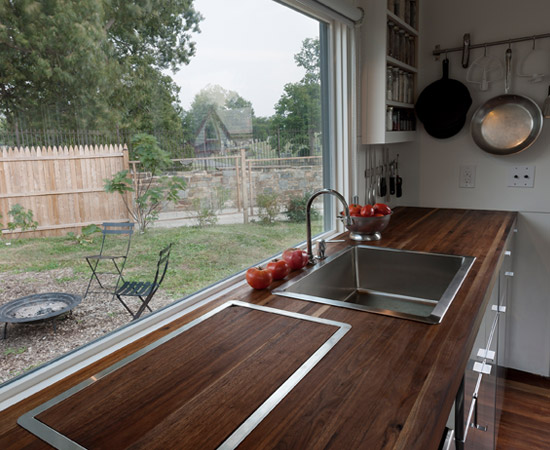
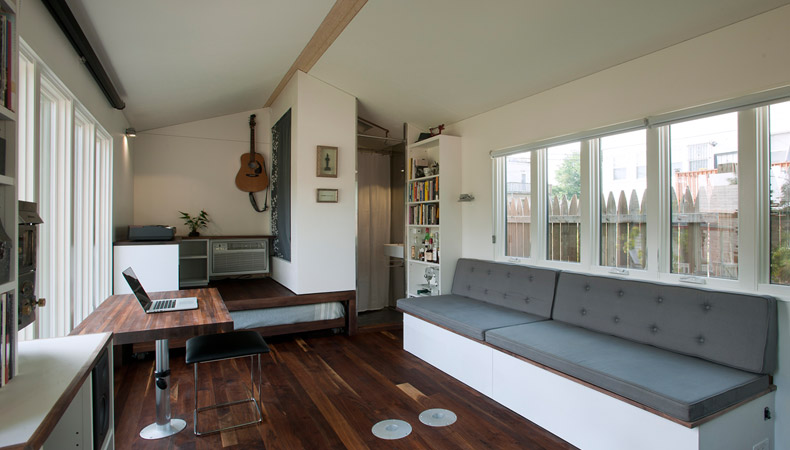
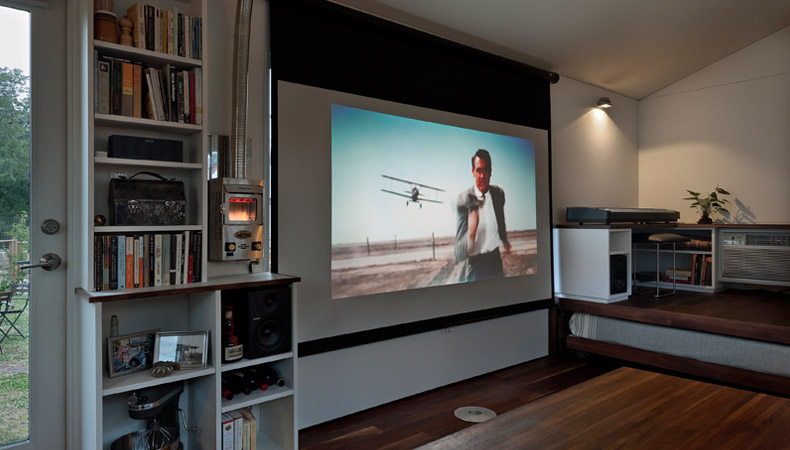
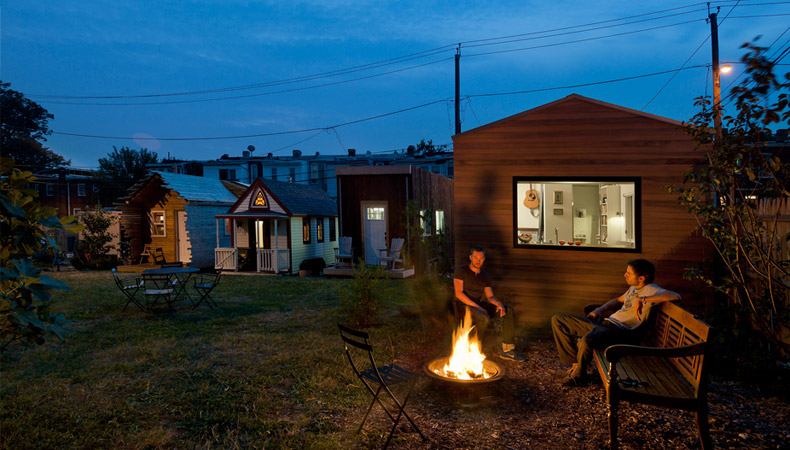
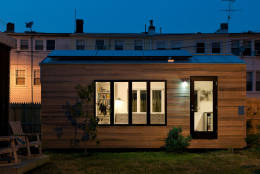
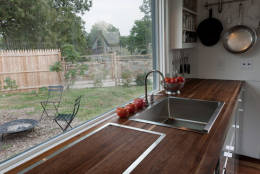
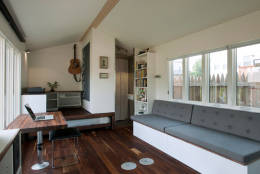
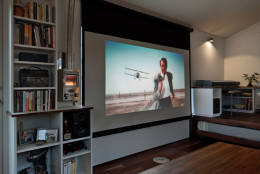
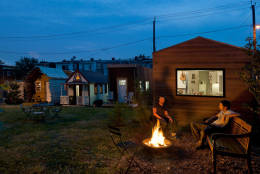
WASHINGTON — When Brian Levy started designing his own home four years ago, there were a few things on his “must-have” list.
The passionate cook wanted a kitchen with plenty of counter space and storage options for appliances such as his bread machine and stand mixer. As a renewable energy professional who works from home, Levy needed a full-sized desk and a conference table for extra work space.
A pull-down projector screen, a decent-sized bathroom and an outdoor entertaining area were also among the desired amenities.
And Levy got them all — into 210 square feet.
“I didn’t want to feel like I was compromising on my life to live in a smaller, more efficient, more environmentally sustainable space,” he said.
Levy is the founder of Minim Homes LLC, a company that designs, builds and ships tiny homes all over the world to people who are looking to downsize their dwellings. The company, which Levy runs with David Bamford and Chris VanArsdale, is relatively new — the group started offering pre-built homes just a month ago — but Levy’s involvement in the tiny house movement is not.
In 2012, the D.C. resident purchased a 5,000 square-foot alley lot off North Capitol Street in Northeast. There, he started Micro Showcase, which he describes as “an effort to build and showcase micro-homes and to show people how you can live well in small spaces.”
The showcase, which is open to the public to tour, includes Levy’s home (dubbed the Minim House), a studio shed and a mobile office. In previous years, a few other tiny homes were included in the showcase, but that is no longer the case.
Levy became interested in minimalist living several years ago while visiting his sister in Washington state. At the time, she was working on an organic farm, and the housing provided was a trailer.
“That’s when I drank the Kool-Aid,” Levy said. “And I got to thinking: Would it be possible to design and build something even more beautiful, more functional, that was a small structure?”
When Levy returned to the District, he worked closely with Foundry Architects to do just that. His 11-foot-wide and 22-feet-long Minim House has a pullout queen bed, a 5-foot desk and office space and a 10-foot galley kitchen. There’s also a multipurpose table that can be used to draft proposals for work or seat six for dinner, and a projector screen that doubles as a window shade.
“You can have movie night in here. It’s better than my row house, which has a smaller TV screen,” Levy said.
Right about the time Levy launched Micro Showcase, the rest of the country was becoming less obsessed with space, and more interested in sustainability. “Mini” hit mainstream in 2014 when HGTV debuted the show “Tiny House Hunters,” now in its third season.
Levy’s showcase attracted hundreds of people on its weekend tours, and a lot of the visitors wanted the floor plans to his home — so he started selling them for $495.
“Lots of people came and saw it, and it became a bit of a thing,” Levy said.
This fall, the Minim Homes team expanded its offerings and began selling pre-built homes for a base price of $71,000. Add-ons include propane burners for the kitchen ($1,000), a stainless shower for the bathroom ($1,000), bookcases ($460) and solar panels ($8,200).
The homes, which are slightly larger than Levy’s at 265 square feet, are constructed in a factory in Pittsburgh and can be built either on wheels or on a foundation. But before you whip out your credit card, Levy has a warning: Owning a tiny home “is not for the faint of heart.”
Different communities have different rules when it comes to building and zoning. For example, D.C. does not allow residents to live in homes on wheels. However, Levy explains the city recently passed legislation that OKs accessory dwelling units, or ADUs, which are attached or detached structures to existing homes.
“So let’s say you’ve got a row house in Petworth, and you’ve got a big backyard. Now you can actually build a detached structure that can be a residential unit,” he said.
And now, that structure can be a foundation-built Minim Home.
“It opens up the possibility of more affordable housing. It allows people to age in place. Say you’re an aging couple, you can move into the new smaller structure in the backyard, and rent out the front,” Levy said.
Now that Minim Homes has launched its pre-built business, it’s turning its attention to the office. Levy and his partners are getting ready to unveil their designs for a mobile workspace.






